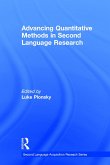Monica Heller, Sari Pietikäinen, Joan Pujolar
Critical Sociolinguistic Research Methods
Studying Language Issues That Matter
Monica Heller, Sari Pietikäinen, Joan Pujolar
Critical Sociolinguistic Research Methods
Studying Language Issues That Matter
- Gebundenes Buch
- Merkliste
- Auf die Merkliste
- Bewerten Bewerten
- Teilen
- Produkt teilen
- Produkterinnerung
- Produkterinnerung
Critical Sociolinguistic Research Methods is a guide to conducting concrete ethnographic and discourse analytic research projects, written by top scholars for students and researchers in social science fields.
Andere Kunden interessierten sich auch für
![A Guide to Quantitative Research Methods in Second Language Pronunciation A Guide to Quantitative Research Methods in Second Language Pronunciation]() Charlie NagleA Guide to Quantitative Research Methods in Second Language Pronunciation199,99 €
Charlie NagleA Guide to Quantitative Research Methods in Second Language Pronunciation199,99 €![Advancing Quantitative Methods in Second Language Research Advancing Quantitative Methods in Second Language Research]() Luke PlonskyAdvancing Quantitative Methods in Second Language Research264,99 €
Luke PlonskyAdvancing Quantitative Methods in Second Language Research264,99 €![Critical Thinking Critical Thinking]() Gregory HadleyCritical Thinking176,99 €
Gregory HadleyCritical Thinking176,99 €![Language, Ideology and Point of View Language, Ideology and Point of View]() Paul SimpsonLanguage, Ideology and Point of View252,99 €
Paul SimpsonLanguage, Ideology and Point of View252,99 €![The Practice of Critical Discourse Analysis The Practice of Critical Discourse Analysis]() Meriel BloorThe Practice of Critical Discourse Analysis220,99 €
Meriel BloorThe Practice of Critical Discourse Analysis220,99 €![Writing the Methods Sections of Research Articles in Language Education Writing the Methods Sections of Research Articles in Language Education]() Jason Miin-Hwa LimWriting the Methods Sections of Research Articles in Language Education37,99 €
Jason Miin-Hwa LimWriting the Methods Sections of Research Articles in Language Education37,99 €![Using Priming Methods in Second Language Research Using Priming Methods in Second Language Research]() Kim McDonoughUsing Priming Methods in Second Language Research187,99 €
Kim McDonoughUsing Priming Methods in Second Language Research187,99 €-
-
-
Critical Sociolinguistic Research Methods is a guide to conducting concrete ethnographic and discourse analytic research projects, written by top scholars for students and researchers in social science fields.
Hinweis: Dieser Artikel kann nur an eine deutsche Lieferadresse ausgeliefert werden.
Hinweis: Dieser Artikel kann nur an eine deutsche Lieferadresse ausgeliefert werden.
Produktdetails
- Produktdetails
- Verlag: Routledge
- 2. Auflage
- Seitenzahl: 238
- Erscheinungstermin: 27. Mai 2024
- Englisch
- Abmessung: 260mm x 183mm x 17mm
- Gewicht: 650g
- ISBN-13: 9781032495286
- ISBN-10: 1032495286
- Artikelnr.: 70148635
- Herstellerkennzeichnung
- Libri GmbH
- Europaallee 1
- 36244 Bad Hersfeld
- gpsr@libri.de
- Verlag: Routledge
- 2. Auflage
- Seitenzahl: 238
- Erscheinungstermin: 27. Mai 2024
- Englisch
- Abmessung: 260mm x 183mm x 17mm
- Gewicht: 650g
- ISBN-13: 9781032495286
- ISBN-10: 1032495286
- Artikelnr.: 70148635
- Herstellerkennzeichnung
- Libri GmbH
- Europaallee 1
- 36244 Bad Hersfeld
- gpsr@libri.de
Monica Heller is Professor Emerita at the Ontario Institute for Studies in Education and the Department of Anthropology, University of Toronto, Canada. A Fellow of the Royal Society of Canada, she is also a Past President of the American Anthropological Association. Sari Pietikäinen is Professor of Discourse Studies in the Department of Language and Communication Studies, University of Jyväskylä, Finland. She is also Director of the Jyväskylä Discourse Hub. Joan Pujolar is Professor of Sociolinguistics in the Arts and Humanities Department at the Universitat Oberta de Catalunya, Spain. He is also Director of the Research Group on Language, Culture and Identity in the Global World and a Past President of the Catalan Society of Sociolinguistics.
List of Illustrations
Acknowledgements
Introduction
0.1 Why Language Matters Now
0.2 Research as Socially Constructed Knowledge
0.3 Research as Experience and as Conversation
0.4 The Research Process: Sequencing, Recursivity and Rhizome
0.5 The Authors as Your Guides and Conversational Partners
0.6 Summary
1 First Key Moment: Formulating Your Research Question
1.1 Research Questions as (Hi)Stories and Conversations
1.2 Different Ways to Get to Your Research Questions
1.3 Reflexivity, Ethics and Research Questions
1.4 Summary
2 Second Key Moment: Designing Your Research
2.1 What Is Research Design?
2.2 Research Design as Projected Work Plan
2.3 Where to Start? With Whom?
2.4 Approaches and Evidence
2.5 Data Recording and Documentation
2.6 Ethics and Politics
2.7 Research Design as Discursive Genre
2.8 Summary
3 Third Key Moment: Generating your Data
3.1 Fieldwork: Producing Data
3.2 Observing: Finding Out What People Do
3.3 Eliciting: Finding Out What People Say
3.4 Material Traces: Other Voices
3.5 Summary
4 Fourth Key Moment: Analyzing Your Data
4.1 What Is Analysis? What Does It Feel Like to Do It?
4.2 Mapping (and Categorizing)
4.3 Tracing
4.4 Connecting
4.5 Claiming
4.6 Analysis as Ethical and Political Conversation
4.7 Pulling It Together
4.8 Summary
5 Fifth Key Moment: Making Your Story
5.1 Writing the Story the Research Tells
5.2 Researchers as Knowledge Producers
5.3 Genre Expectations
5.4 Knowledge Mobilization
5.5 Summary
6 Shop Floor
6.1 Introduction: What Do We Mean by Shop Floor?
6.2 Moment 2: Designing Your Research
6.3 Moment 3: Generating Your Data
6.4 Moment 4: Analyzing Your Data
6.5 Moment 5: Making Your Story
Epilogue
References
Further Reading
Index
Acknowledgements
Introduction
0.1 Why Language Matters Now
0.2 Research as Socially Constructed Knowledge
0.3 Research as Experience and as Conversation
0.4 The Research Process: Sequencing, Recursivity and Rhizome
0.5 The Authors as Your Guides and Conversational Partners
0.6 Summary
1 First Key Moment: Formulating Your Research Question
1.1 Research Questions as (Hi)Stories and Conversations
1.2 Different Ways to Get to Your Research Questions
1.3 Reflexivity, Ethics and Research Questions
1.4 Summary
2 Second Key Moment: Designing Your Research
2.1 What Is Research Design?
2.2 Research Design as Projected Work Plan
2.3 Where to Start? With Whom?
2.4 Approaches and Evidence
2.5 Data Recording and Documentation
2.6 Ethics and Politics
2.7 Research Design as Discursive Genre
2.8 Summary
3 Third Key Moment: Generating your Data
3.1 Fieldwork: Producing Data
3.2 Observing: Finding Out What People Do
3.3 Eliciting: Finding Out What People Say
3.4 Material Traces: Other Voices
3.5 Summary
4 Fourth Key Moment: Analyzing Your Data
4.1 What Is Analysis? What Does It Feel Like to Do It?
4.2 Mapping (and Categorizing)
4.3 Tracing
4.4 Connecting
4.5 Claiming
4.6 Analysis as Ethical and Political Conversation
4.7 Pulling It Together
4.8 Summary
5 Fifth Key Moment: Making Your Story
5.1 Writing the Story the Research Tells
5.2 Researchers as Knowledge Producers
5.3 Genre Expectations
5.4 Knowledge Mobilization
5.5 Summary
6 Shop Floor
6.1 Introduction: What Do We Mean by Shop Floor?
6.2 Moment 2: Designing Your Research
6.3 Moment 3: Generating Your Data
6.4 Moment 4: Analyzing Your Data
6.5 Moment 5: Making Your Story
Epilogue
References
Further Reading
Index
List of Illustrations
Acknowledgements
Introduction
0.1 Why Language Matters Now
0.2 Research as Socially Constructed Knowledge
0.3 Research as Experience and as Conversation
0.4 The Research Process: Sequencing, Recursivity and Rhizome
0.5 The Authors as Your Guides and Conversational Partners
0.6 Summary
1 First Key Moment: Formulating Your Research Question
1.1 Research Questions as (Hi)Stories and Conversations
1.2 Different Ways to Get to Your Research Questions
1.3 Reflexivity, Ethics and Research Questions
1.4 Summary
2 Second Key Moment: Designing Your Research
2.1 What Is Research Design?
2.2 Research Design as Projected Work Plan
2.3 Where to Start? With Whom?
2.4 Approaches and Evidence
2.5 Data Recording and Documentation
2.6 Ethics and Politics
2.7 Research Design as Discursive Genre
2.8 Summary
3 Third Key Moment: Generating your Data
3.1 Fieldwork: Producing Data
3.2 Observing: Finding Out What People Do
3.3 Eliciting: Finding Out What People Say
3.4 Material Traces: Other Voices
3.5 Summary
4 Fourth Key Moment: Analyzing Your Data
4.1 What Is Analysis? What Does It Feel Like to Do It?
4.2 Mapping (and Categorizing)
4.3 Tracing
4.4 Connecting
4.5 Claiming
4.6 Analysis as Ethical and Political Conversation
4.7 Pulling It Together
4.8 Summary
5 Fifth Key Moment: Making Your Story
5.1 Writing the Story the Research Tells
5.2 Researchers as Knowledge Producers
5.3 Genre Expectations
5.4 Knowledge Mobilization
5.5 Summary
6 Shop Floor
6.1 Introduction: What Do We Mean by Shop Floor?
6.2 Moment 2: Designing Your Research
6.3 Moment 3: Generating Your Data
6.4 Moment 4: Analyzing Your Data
6.5 Moment 5: Making Your Story
Epilogue
References
Further Reading
Index
Acknowledgements
Introduction
0.1 Why Language Matters Now
0.2 Research as Socially Constructed Knowledge
0.3 Research as Experience and as Conversation
0.4 The Research Process: Sequencing, Recursivity and Rhizome
0.5 The Authors as Your Guides and Conversational Partners
0.6 Summary
1 First Key Moment: Formulating Your Research Question
1.1 Research Questions as (Hi)Stories and Conversations
1.2 Different Ways to Get to Your Research Questions
1.3 Reflexivity, Ethics and Research Questions
1.4 Summary
2 Second Key Moment: Designing Your Research
2.1 What Is Research Design?
2.2 Research Design as Projected Work Plan
2.3 Where to Start? With Whom?
2.4 Approaches and Evidence
2.5 Data Recording and Documentation
2.6 Ethics and Politics
2.7 Research Design as Discursive Genre
2.8 Summary
3 Third Key Moment: Generating your Data
3.1 Fieldwork: Producing Data
3.2 Observing: Finding Out What People Do
3.3 Eliciting: Finding Out What People Say
3.4 Material Traces: Other Voices
3.5 Summary
4 Fourth Key Moment: Analyzing Your Data
4.1 What Is Analysis? What Does It Feel Like to Do It?
4.2 Mapping (and Categorizing)
4.3 Tracing
4.4 Connecting
4.5 Claiming
4.6 Analysis as Ethical and Political Conversation
4.7 Pulling It Together
4.8 Summary
5 Fifth Key Moment: Making Your Story
5.1 Writing the Story the Research Tells
5.2 Researchers as Knowledge Producers
5.3 Genre Expectations
5.4 Knowledge Mobilization
5.5 Summary
6 Shop Floor
6.1 Introduction: What Do We Mean by Shop Floor?
6.2 Moment 2: Designing Your Research
6.3 Moment 3: Generating Your Data
6.4 Moment 4: Analyzing Your Data
6.5 Moment 5: Making Your Story
Epilogue
References
Further Reading
Index








